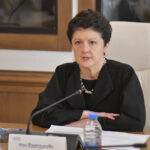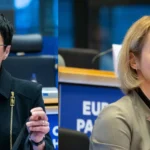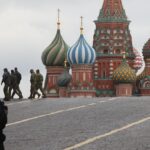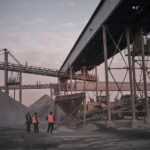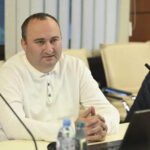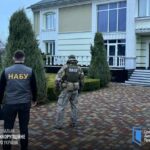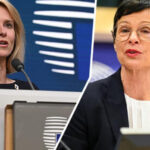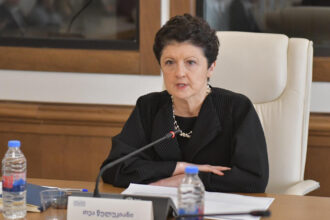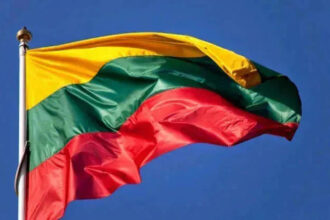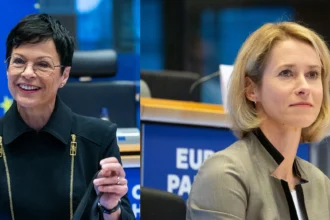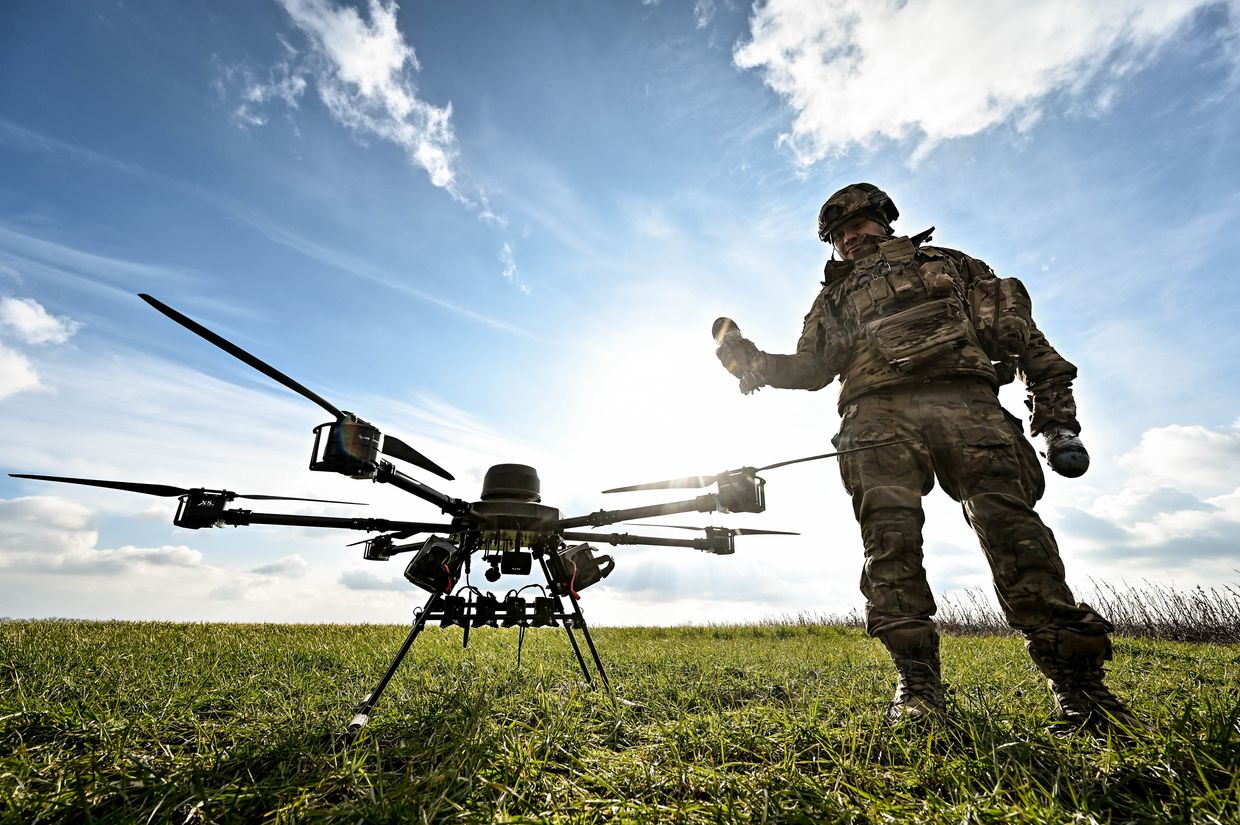Ukraine has become an innovation hotbed in defense, as Russia’s deadly incursion fuels the rapid development of new battlefield technology.
Kyiv wants to be a leader in the world’s defense sector. But with its economy depleted by the war, foreign investment is needed to achieve this goal.
According to government estimates Ukraine has the capability to produce around 20 billion dollars worth of weapons and other equipment, but the state budget only can fund around 6 billion.
The government has launched a number of initiatives to encourage foreign investments, including the Brave1 Accelerator Program, which will be launched in April 2023. It brings together investors, defense start-ups and government stakeholders, to encourage innovation.
Brave1 has been working with strategic partners Andre Pienaar and Rear Admiral Michael Hewitt. They are co-founders and chief executives of investment firm C5 Capital and IP3, respectively.
The Kyiv independent spoke with two investors about the state and future of Ukraine’s defence start-ups. They also discussed what technologies excite them most today and what can be achieved to encourage more investment into Ukraine’s Defense Industry.
The following has been edited to lengthen and make it more clear.
The Kyiv independent: How would describe Ukraine’s defense sector as it is now? What has changed over time?
Michael Hewitt, a former defense industry official, says that Ukraine is now focusing on asymmetric warfare and drone warfare – air, sea or subsea.
We want to take this to the next level of venture capital, which is growth, scalability and achieving what President Zelensky had said he would do, namely build capacity in the defence industry. From artillery shells to a capacity to defend the nation and be a part of the European Defense Industry, we’re looking to do everything from building up the defense industry to bringing in venture capital.
Second, he wants to protect and expand his own defense industry base. We must also protect and expand the assets of key Ukrainian companies that were previously involved in the defense industry.
The pure innovative technology side is where we are most focused.
The Kyiv Independent : Which recent innovations have you been most excited about?
Andre Pienaar : I believe Ukraine is leading today in the use and application of unmanned vehicles, whether on land, sea or air. These are two very exciting fields.
Another area that isn’t discussed as much, but is equally important, is cybersecurity. We believe that the cybersecurity market in Ukraine, although still small (about $100 million), has tremendous potential to grow.
Ukraine has long been a source of technology professionals and know-how. Many American, British and European companies rely on Ukrainian technology professionals and Ukrainian engineering for their R&D.
The same world-class engineering and know-how are now being applied to cybersecurity. We see that not only are Ukrainian cybersecurity service companies growing, but new cybersecurity products are also being created in Ukraine.
This ability to work closely with Ukrainian cybersecurity firms is very beneficial, not only for Ukraine but also for the U.S., because the things that Russia tries to do with cybersecurity to Ukraine will at some point make their way into the form of cyber attacks or ransomware on America.
The Kyiv independent: BraveOne announced a few weeks ago that Ukraine’s defense technology industry had attracted private investments of $12 million since the start of the war. This number is higher than last year, but still low when compared to other nations. What do you believe is stopping investors?
Andre Pienaar says that this year, around $9 billion was invested in U.S. defense technology startups and about $ 2 billion in Europe.
In that context, 12 million dollars is a modest amount of money. We will be working hard to bring in more VC firms from other allied nations to Ukraine so that we can build a VC community around Ukraine and scale this capital.
There are two things we can do to help Ukraine grow this capital.
One way to do this is to mentor as many founders as you can about the lessons learned, the mistakes made, as well as how to work with venture capital and outside capital.
I think that many Ukrainian entrepreneurs are still learning how venture capital works and how to open their business for outside investment.
The second thing that I think is important is that the Ukrainian government does everything it can to remove restrictions on the exportation of intellectual property and knowhow, so that Ukrainian founders are able to build companies that will go global and become unicorns.
The U.S. has a large market. It has access a lot of money. The most successful American VC backed companies are all global companies. They’ve become global businesses because they aren’t subject to export restrictions.
I think it is important to ease export restrictions in a way that protects Ukrainian interests and protects Ukrainian know-how while also allowing Ukrainian companies to grow and scale their businesses globally, and access other markets.
The Kyiv Independent : Ukraine’s defence field is quite crowded. Experts predict consolidation in the future. What makes a startup stand out among the hundreds of others vying for attention?
Michael Hewitt : It’s a crowded market, and it can be difficult to distinguish one UAS (Unmanned Aerial System), from another.
Our view of innovative tech in Ukraine goes beyond hardware. It could be software, training, or even a simple understanding that a small modification can be made to increase the effectiveness of these companies’ warfighting.
I think a lot of it is moving beyond first-person view drones or autonomous robots to operate in the electromagnetic spectrum. The Russians are very good at jamming our anti-drone technology.
It’s amazing that you can bring down a $100-million fighter jet using a homemade system. The opposite is also true. We have to fire missiles worth millions of dollars at Russian drones.
In this crowded field, our goal is to find technologies that have proven successful on the battlefield and that can be adapted and developed for war — technologies that can be constantly improved and are in constant development.
Finally, we have one that we think will ultimately be exportable to the international market.
The connection between warfighter technology and the Ukrainian warfighter is something that I find amazing and we want to accelerate. It’s a result of fighting to survive.
The Kyiv independent: What are your final thoughts on the defense tech investment in Ukraine?
Andre Pienaar : Our mission is to increase the capital invested in Ukrainian companies from $20 to hundreds of millions.
Nothing prevents Ukraine’s ability to attract a half billion dollars in venture capital each year from the U.S.A., UK, Europe and elsewhere.
We will work hard to educate other investors about the opportunities in Ukraine. We will teach them how to invest in Ukraine successfully, how travel to Ukraine is done, how to meet Ukrainian entrepreneurs, and how to match the potential in the defense sector with new capital.
I want to state on record that we think that the Ukrainian defense industry will attract a half-billion dollars in venture capital over the next five years.
Andrea Januta, a Kyiv Independent reporter, is based in Kyiv. She spent six years in New York as an investigative journalist with Reuters, where she was awarded a Pulitzer Prize for Explanatory Journalism. Her work at Reuters led to federal investigations, congressional meetings, and new legislation. She was a financial data analysts at Goldman Sachs before becoming a journalist.
Read More @ kyivindependent.com
